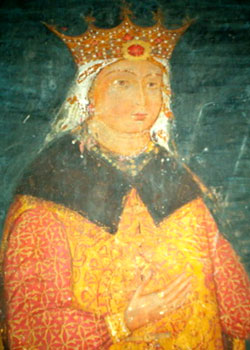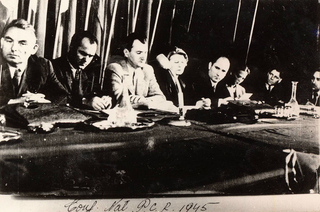| |||||
| Decades: | |||||
|---|---|---|---|---|---|
| See also: | |||||
Events from the year 1920 in Romania. The year was marked by the signing of the Treaty of Trianon and Treaty of Paris, and a general strike.
| |||||
| Decades: | |||||
|---|---|---|---|---|---|
| See also: | |||||
Events from the year 1920 in Romania. The year was marked by the signing of the Treaty of Trianon and Treaty of Paris, and a general strike.

Year 328 (CCCXXVIII) was a leap year starting on Monday of the Julian calendar. At the time, it was known as the Year of the Consulship of Ianuarinus and Iustus. The denomination 328 for this year has been used since the early medieval period, when the Anno Domini calendar era became the prevalent method in Europe for naming years.

The Battle of Orbic was a battle between the armies led by Stephen the Great and Petru Aron that took place in Orbic.

Tudor Ciortea was a Romanian composer, musicologist, and music educator.

Doamna Maria Voichița was a Princess consort of Moldavia (1480–1511).
Constantin Gheorghe Banu was a Romanian writer, journalist and politician, who served as Arts and Religious Affairs Minister in 1922–1923. He is remembered in literary history as the founder of Flacăra review, which he published in two editions, alongside Petre Locusteanu, Ion Pillat, Adrian Maniu, and, later, Vintilă Russu-Șirianu. A best-selling magazine for its time, it functioned as a launching pad for several writers of the Romanian Symbolist movement.
George Potra was an Austro-Hungarian-born Romanian teacher and historian. He was one the founders of the historical study of Bucharest.

Events from the year 1945 in Romania. The year saw the end of Romania's involvement in World War II and the foundation of the pro-Communist government of Petru Groza.
Events from the year 1947 in Romania. The year saw the abdication of Michael I of Romania and foundation of the Romanian People's Republic.
Events from the year 1946 in Romania. The year started with the end of the royal strike and ended with the Romanian Communist Party win the first election following the introduction of women's suffrage.
Events from the year 1935 in Romania. The year saw the foundation of the Romanian Academy of Sciences.
Events from the year 1956 in Romania. At the University of Bucharest, students demonstrated in support of the Hungarian Revolution. The year also saw the end of the last SovRom joint enterprises and the first broadcast from TVR, Romania's first TV network.
Events from the year 1932 in Romania. The year saw the birth of two future Woman Grandmasters, Maria Albuleț and Margareta Teodorescu.
Events from the year 1933 in Romania. The year saw the Grivița strikes, the formation of the Little Entente, and the assassination of the Prime Minister Ion G. Duca.
Events from the year 1964 in Romania. The year saw increasing separation from Soviet influence.
Events from the year 1963 in Romania. The year saw the continued de-satellization of Communist Romania.
Events from the year 1929 in Romania. The year was dominated by the Great Depression. Romania won on the first Balkan Cup, held this year.
Events from the year 1921 in Romania. The year saw the formation of the Romanian Communist Party out of the Socialist Party and subsequent imprisonment of the Communist leadership.
Events from the year 1922 in Romania. The year saw the Dealul Spirii Trial and the crowning of King Ferdinand.
Events from the year 1881 in Romania. The year saw the end of the United Principalities of Moldavia and Wallachia and the creation of the Kingdom of Romania.
Events from the year 1882 in Romania. The year saw the departure of the Thetis, carrying Romanian Jews to Palestine.